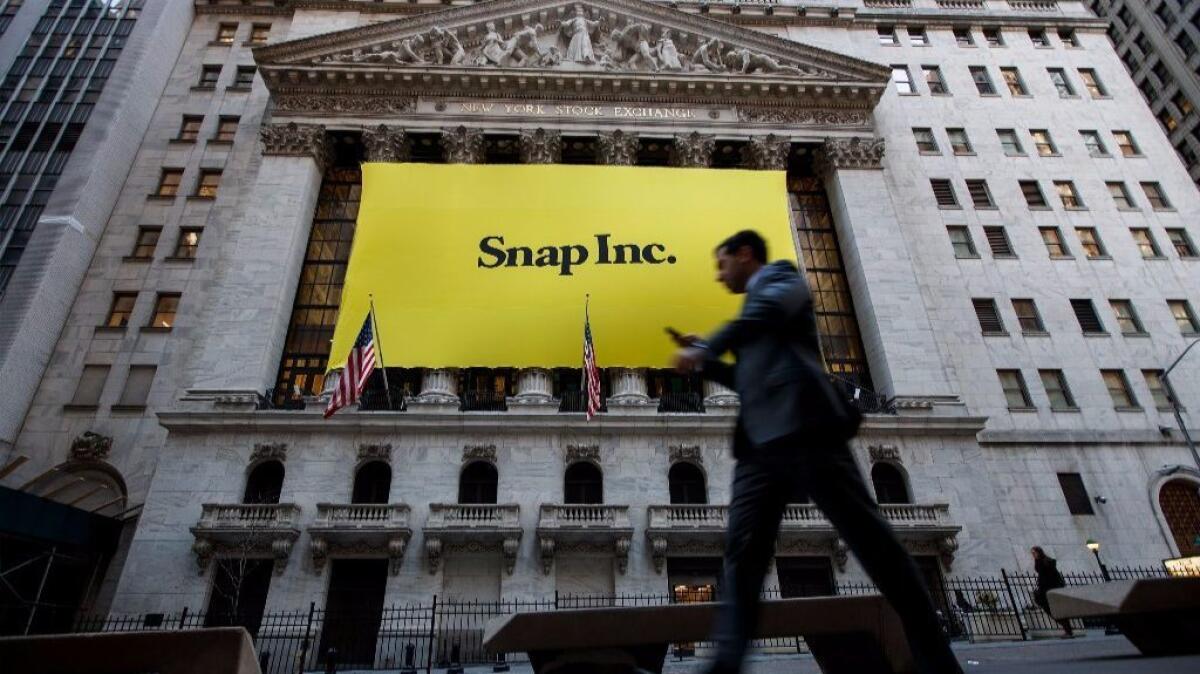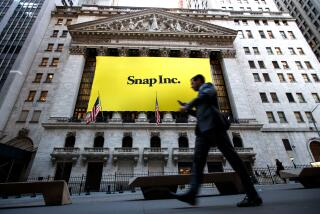Snapchat redesign is in the works amid weak growth in users and ad sales

- Share via
One of the longest running complaints about Snapchat is that the video-messaging app is simply confusing.
That, Snap Inc. conceded Tuesday, must change.
Reeling from his company’s third consecutive quarter of lackluster user growth and ad sales, co-founder and Chief Executive Evan Spiegel said Tuesday that Snap will retool its video-messaging app to make it more welcoming to a broader audience.
The upcoming redesign marks a major shift for the Venice company, which had implored investors to be patient as advertisers caught up to its novel offerings and young and hip aesthetic.
But ever since Snap went public in Southern California’s largest-ever IPO, the company has struggled to show it can grow its business in the face of competition from Facebook’s Instagram and WhatsApp. Tuesday’s results sparked a nearly 20% plunge in Snap shares in after-hours trading.
“This was them throwing in the white towel and it’s clear it’s a strategic shift,” said Daniel Ives, an analyst for GBH Insights. “I view it as a sign they looked in the mirror and realized this was not working and the results speak to this. I at least give them credit for shifting before it’s too late as they have to turn this around and the app is front and center.”
The overhaul of the app will include one feature familiar to users of other social media services: a timeline that’s algorithmic rather than chronological.
Spiegel said the company would personalize users’ Stories feed by “leveraging the tremendous benefits of machine learning.”
Spiegel warned that the redesign will be disruptive to the company’s business in the short term and that it was unknown how it would be received by Snapchat’s core users.
“We’re willing to take that risk for what we believe are substantial long-term benefits to our business,” Spiegel said.
Already, Snap has seen how disruptive change can be after it introduced an automated ad buying platform to make it easier for marketers and brands, especially smaller ones, to place ads.
While that helped spark a surge in ads, it also drove down prices by more than 60% year-over-year — one of the reasons why the company’s third-quarter revenue was $208 million, up 62% from a year earlier but 13% below the $238 million that Wall Street expected. Snap’s losses in the quarter widened to $443 million, compared with $124 million a year earlier.
“The shift to programmatic ad buying is a major head wind for Snap and clearly hurt them this quarter,” Ives said.
Snap boosted its user tally during the quarter by 5 million, to 178 million, below analysts’ expectations of 8 million new users.
Snap priced its March IPO at $17 a share and enjoyed a rollicking debut. But in Snap’s first two quarters as a public company, its shares fell 21% and 17%, respectively, the day after reporting its quarterly earnings.
That trend continued Tuesday. Snap shares closed at $15.12, up 2%, but quickly plunged nearly 20% after the quarterly results were disclosed.
An overhaul of the app could signal the company is following a path blazed by its bitter competitor, Facebook, which evolved from a social network for Ivy League college students into an all-ages, global platform.
Snapchat “used to be cool and niche — something your parents just didn’t understand. And now they’re essentially redesigning to court the parents,” said Melissa Parrish, an analyst for Forrester.
To fend off mimicry from Facebook-owned services, Snap has touted its youthful appeal and unique ideas as a saving grace. But following its predecessors and building a bigger and perhaps slightly older audience might be just what the company needs, Parrish said.
“It’s what they have to do if they want to grow their user base,” she said. “So improving the interface might be seen as selling out, but I would call it a necessary maturation.”
Follow me @dhpierson on Twitter
UPDATES:
7:20 p.m: This article was updated to include comment from analysts Daniel Ives and Melissa Parrish.
This article was originally published at 1:55 p.m.
More to Read
Inside the business of entertainment
The Wide Shot brings you news, analysis and insights on everything from streaming wars to production — and what it all means for the future.
You may occasionally receive promotional content from the Los Angeles Times.











